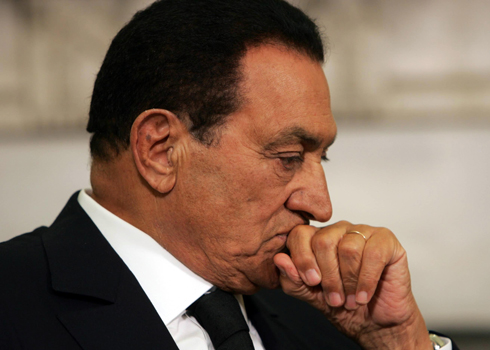On the 17th day of protests that have gripped his country and commanded the attention of the world, Egypt’s President Hosni Mubarak made a televised speech in which he repeated his pledge not to seek re-election, announced proposed amendments to the constitution, but did not — as many had expected — leave office.
“Day after day we will continue the transfer of power from now until September,” he said.
Mubarak did say that he had delegated some powers to Vice President Omar Suleiman.
In an interview with CNN after Mubarak’s speech, the Egyptian ambassador to the U.S., Sameh Shoukry, said that Mubarak had transferred all presidential powers to the Vice President, saying the “de jure head of state” of Egypt is Mubarak, while the “de facto head” is now Suleiman.
As Mubarak spoke, the massive crowd gathered in Cairo’s Tahrir Square grew more agitated, and began holding their shoes in the air in unison.
“Egypt is going through difficult time, and we can not do anything that causes damage to our economy day after day,” Mubarak said.
After Mubarak spoke, Suleiman gave his own televised speech, urging protestors to go home and to work together with the government for the transition.
“We have opened the door of dialogue, and we have reached some understandings and we have a road map in order to achieve most of the demands,” Suleiman said. “The door is still open for more dialogue.”
The Vice President also took a shot at foreign media, telling Egyptians to not listen to “the satellite stations that have no objective but to have sedition among people and to weaken Egypt.”
In the wake of Mubarak’s speech, Nobel laureate and opposition leader Mohamed ElBaradei tweeted: “Egypt will explode. Army must save the country now.”
Earlier Thursday, the Egyptian military declared that it would take steps “to maintain the homeland and the achievements and the aspirations of the great people of Egypt,” according to The New York Times. The military has stayed mostly on the sidelines since protests began on January 25, but the Times reported that today’s statement was “strongly suggestive that it had arranged to take power.”
The Times also said that Gen. Hassan al-Roueini, military commander for the Cairo area, appeared earlier in Tahrir Square and told demonstrators: “All your demands will be met today.”
The number of people gathered in Tahrir Square swelled in anticipation of Mubarak’s remarks. CNN reported people chanting, “down, down Mubarak.”
Before Mubarak spoke, American officials seemed to think that he would go.
“There’s a strong likelihood that Mubarak may step down in Egypt tonight,” CIA Director Leon Panetta told a House Intelligence panel Thursday morning, although he later added, “we have not received specific reports.”
During a speech at Northern Michigan University, President Obama said he was following the events closely, and would say more “as this plays out.”
“What is absolutely clear is that we’ve been witnessing history unfold,” Obama said. “[I]t’s a moment of transformation that is taking place because the people of Egypt are calling for change and they’ve turned out in extraordinary numbers — people of all ages and all walks of life.”
Today’s announcement was the third time that Mubarak has spoken publicly since the unrest began. In his previous speech, on February 1, the 82-year-old Mubarak tried to mollify the protesters by announcing that he would not run for re-election in September. But the demonstrations continued.
A week ago, Mubarak told ABC News’ Christiane Amanpour in an interview that he was tired of being president but feared that chaos would ensue if he gave up power immediately.
Watch:






